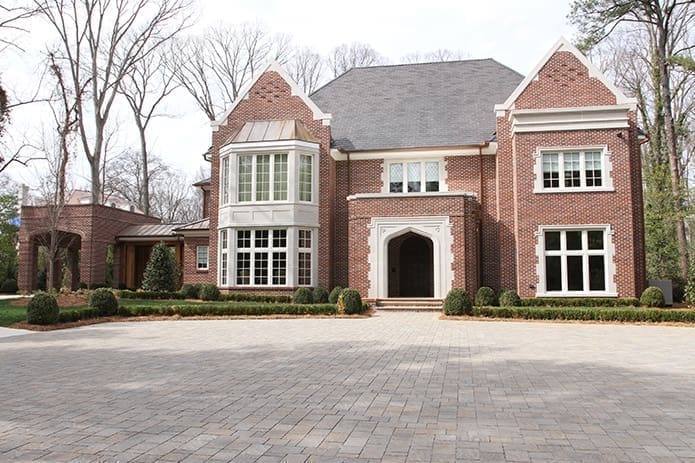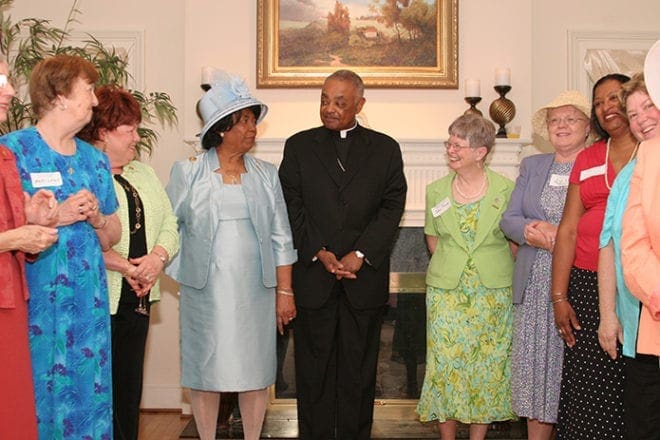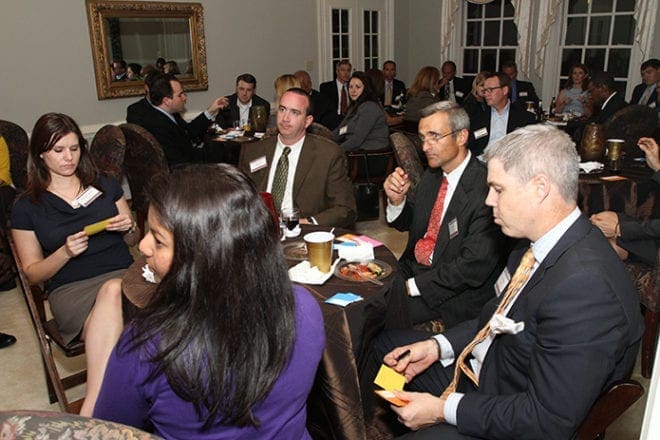 Photo By Michael Alexander
Photo By Michael Alexander
Atlanta
Archbishop apologizes, will seek more counsel on his new residence
By MARY ANNE CASTRANIO, Staff writer | Published April 3, 2014
ATLANTA—Responding to public and media criticism about his new residence in Buckhead, Archbishop Wilton D. Gregory issued a statement of apology to the Catholics of the Archdiocese of Atlanta in his column in the April 3 issue of The Georgia Bulletin.
He said, “As the Shepherd of this local Church, a responsibility I hold more dear than any other, certainly more than any configuration of brick and mortar, I am disappointed that, while my advisors and I were able to justify this project fiscally, logistically and practically, I personally failed to project the cost in terms of my own integrity and pastoral credibility with the people of God of north and central Georgia.”
He acknowledged that he had received “heartfelt, genuine and candidly rebuking letters, emails and telephone messages” over the past weeks.
“Their passionate indictments of me as a bishop of the Catholic Church and as an example to them and their children are stinging and sincere. And I should have seen them coming,” he wrote.
“To all of you,” he said, “I apologize sincerely and from my heart.”
Archbishop Gregory moved into the newly built home on Habersham Road in January. He wrote about the move in a column published in the Jan. 9 issue of The Georgia Bulletin. Reaction from a small number of parishioners from the Cathedral of Christ the King and several other Atlanta parishes was unfavorable, and the archbishop and Msgr. Frank McNamee, rector of the cathedral, met with 10 people to discuss the plans for both the parish rectory and the residence. Ensuing articles in the Atlanta Journal-Constitution and other media outlets were critical of the plans.
In his April 3 column, the archbishop said that he would meet with three different consultative bodies of the archdiocese in coming weeks to hear their assessment of what he should do regarding the new residence. The groups are the Council of Priests, Archdiocesan Pastoral Council and Archdiocesan Finance Council. If they so advise, he said the archdiocese would sell the new residence and he would look for another place to reside.
Archbishop Gregory reiterated that he had not initiated the move from his previous residence on West Wesley Road, near the Cathedral of Christ the King. This historic home, built around 1920 and purchased by the archdiocese in 1966, had been the residence of the archbishops of Atlanta since the tenure of Archbishop Paul J. Hallinan. He had agreed to a request from Msgr. McNamee to allow the Cathedral parish to purchase the home so that it could be used as a rectory for the priests of the Cathedral.
Archbishop Gregory said, “It made more sense for them to be in walking distance to the Cathedral than I, so I said yes, knowing full well that literally left the Archbishop without a place to live.”
After that agreement an unexpected bequest in 2012 from Joseph Mitchell, nephew of “Gone With the Wind” author Margaret Mitchell, allowed the Cathedral to purchase the West Wesley house. Plans for the replacement of the residence then moved forward.
Part of the bequest was Joseph Mitchell’s home on Habersham Road, a mile away from the existing residence. Archbishop Gregory said, “Through the extraordinary kindness of Joseph Mitchell, we had a perfect piece of property nearby on which to relocate the Archbishop’s residence.”
Archbishop Gregory said, “That’s when, to say the least, I took my eye off the ball.” He said, “The plan seemed very simple. We will build here what we had there—separate living quarters and common spaces, a large kitchen for catering, and lots of room for receptions and other gatherings.
Replacing the old residence
Dennis Kelly, of Catholic Construction Services, Inc., said the main goal of the building project was always “to have the space and level of finish match what he has now.”
He said the project was followed carefully by an oversight committee that included members from several parishes.
The new residence, built in a Tudor style, is about 6,000 square feet and cost $2.2 million, of which $1.9 million came from the purchase of the previous residence by the Cathedral. The additional $300,000 cost is attributable, in part, to making the house fully handicapped accessible, which was something that the committee overseeing the project wanted to do. In addition, the chapel in the new residence is somewhat larger than the chapel in the previous residence. Kelly said that Archbishop Gregory wanted to be able to celebrate “private family Masses at the residence, as he had done before.” The new chapel can hold up to 15 people.
The residence has four bedrooms, including a master suite, where the archbishop lives.

In a 2007 photo Archbishop Wilton D. Gregory checks with Atlanta Archdiocesan Council of Catholic Women president May Fern Barron, left center, to make sure he has covered everything she wanted him to say to the assembly of women at his residence for the annual brunch. Photo By Michael Alexander
The downstairs of the house, according to Kelly, is “pretty much the same footage” as the old house. He said, “It’s different in that the West Wesley house was a family home that had been ‘retrofitted’ to be what it is.” They moved the same furniture from the previous residence in, with the exception of new furniture for the downstairs living room.
Kelly said, “The downstairs was designed specifically for entertaining.”
Throughout the year, Archbishop Gregory, as previous archbishops have done, hosts a number of events at his residence, which can range from gatherings for the priests of the archdiocese, seminarians and their families, and the permanent deacons and their wives, to representatives of the Catholic Foundation of North Georgia, the Atlanta Archdiocesan Council of Catholic Women, the St. Thomas More Society, Catholic Charities Atlanta or other groups. In addition, he hosts visiting clergy and bishops.
Along with a two-car garage, the property includes additional parking for guests.
Kieran Quinn, chairman of the Finance Council for the Archdiocese of Atlanta, said that the new residence is “the home we provide for the archbishop of Atlanta and his successors.” He noted that the residence is an asset of the archdiocese. The Finance Council, a consultative body, reviewed the budget to make sure that the project was within the capital reserves of the archdiocese.
“We made sure everything was spent prudently,” he said.
Father John Koziol, OFM Conv., chairman of the Council of Priests, said Archbishop Gregory had let the council know, at the time, of the request from the Cathedral of Christ the King to sell the West Wesley residence to the parish as a future rectory.
The council was not required to approve it, but was informed and invited to raise questions and to comment, Father Koziol said.
He recalls that there was not a great deal of discussion.
“It seemed to me that he was very sincere in his desire to meet the needs of the Cathedral and to provide a place where the priests could live in close proximity (to parishioners) because that was a concern for them,” Father Koziol said.
A changed world
In his April 3 column, Archbishop Gregory said, “What we didn’t stop to consider, and that oversight rests with me and me alone, was that the world and the Church have changed.”
He said that the bishops of the world had always been “called to live more simply, more humbly, and more like Jesus Christ who challenges us to be in the world and not of the world.”
By example, Pope Francis has profoundly communicated the call to simplicity, he said.
“The example of the Holy Father, and the way people of every sector of our society have responded to his message of gentle joy and compassion without pretense, has set the bar for every Catholic and even for many who don’t share our communion.”
Archbishop Gregory said, “Our intention was to recreate the residence I left behind, yet I know there are situations across the country where local Ordinaries have abandoned their large homes, some because of financial necessity and others by choice, and they continue to find ways to interact with the families in their pastoral care without the perception, real or imagined, of lavish lifestyles.”
Archbishop Gregory acknowledged his failure to “consider the impact on the families throughout the Archdiocese. … to consider the difficult position in which I placed my auxiliary bishops, priests, deacons and staff who have to try to respond to inquiries from the faithful about recent media reports.”
After reading Archbishop Gregory’s statement, Father Koziol said, “I admire the archbishop for what he wrote because he is obviously taking responsibility for the decision to move ahead with the building project and now is willing to reconsider and do some more consulting with the various bodies that are his advisory councils.”
“He is trying to do the right thing. I admire him for being so up front and transparent,” Father Koziol said.
More than one hundred emails and messages have come into the archdiocesan communications office regarding Archbishop Gregory’s column, which was released late Monday, March 31, on The Georgia Bulletin’s website. Most of the reaction has been positive.
Posting to Facebook, Molly Henderson Gamblin, a parishioner at St. Peter Church, LaGrange, said, “Do the people of the archdiocese understand that the Archbishop opens his residence to the religious ladies, priests and many other groups where he needs a residence capable of this? He is one of the most worthy, unselfish people I know and he would never ever knowingly jeopardize his relationship with his flock of the Atlanta Archdiocese.”
Kurt Kronauge, a Cathedral parishioner, called after reading the news reports and the archbishop’s column to express his opinion that the archbishop was “put in a place that was completely unfair.” He added that Archbishop Gregory “doesn’t own this home—this is the property of the archdiocese.” The new residence “was a very wise investment, based on the gift that was received.” He said, “I don’t believe the home should be sold.”
Moving on
Archbishop Gregory said that he intends to obtain advice on how to proceed from the “collective wisdom of our laity and our clergy.”

A reception for the 2011 Catholic Charities Leadership Class takes place at the archbishop’s residence on West Wesley Road. Photo By Michael Alexander
Beginning in April, he will meet with three groups who provide advice and counsel to him in his role as the leader of the archdiocese. He will first meet in April with the Priests’ Council, composed of over 30 priests of the archdiocese, most elected by their peers. In early May he will meet with the Archdiocesan Pastoral Council, comprised of lay people, representing a cross-section of the archdiocese geographically and culturally, who provide guidance and input to him on religious, social and economic issues. He will also request an extraordinary meeting of the Archdiocesan Finance Council, which includes some 15 lay people experienced in finance, civil law and general business matters.
“At each of these meetings I will seek their candid guidance on how best to proceed,” Archbishop Gregory said.
If it is their will, he said, “the archdiocese will begin the process of selling the Habersham residence. I would look to purchase or rent something appropriate elsewhere.”
Archbishop Gregory ended with the assurance that he values the privilege and honor of being the archbishop of Atlanta. “I promise you that my service to you is the reason I get up each day—not the house in which I live or the zip code to which my mail is sent.”
He closed with a request for prayers from the community: “I humbly and contritely ask your prayers for me, and I assure you, as always, of mine for you.”